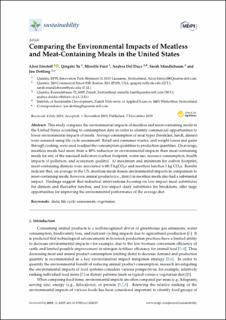Bitte benutzen Sie diese Kennung, um auf die Ressource zu verweisen:
https://doi.org/10.21256/zhaw-19499| Publikationstyp: | Beitrag in wissenschaftlicher Zeitschrift |
| Art der Begutachtung: | Peer review (Publikation) |
| Titel: | Comparing the environmental impacts of meatless and meat-containing meals in the United States |
| Autor/-in: | Ernstoff, Alexi Tu, Qingshi Faist, Mireille Del Duce, Andrea Mandlebaum, Sarah Dettling, Jon |
| et. al: | No |
| DOI: | 10.3390/su11226235 10.21256/zhaw-19499 |
| Erschienen in: | Sustainability |
| Band(Heft): | 11 |
| Heft: | 22 |
| Erscheinungsdatum: | 2019 |
| Verlag / Hrsg. Institution: | MDPI |
| ISSN: | 2071-1050 |
| Sprache: | Englisch |
| Schlagwörter: | Diet; Life Cycle Assessment; Vegetarian |
| Fachgebiet (DDC): | 338.927: Umweltökonomie und nachhaltige Entwicklung |
| Zusammenfassung: | This study compares the environmental impacts of meatless and meat-containing meals in the United States according to consumption data in order to identify commercial opportunities to lower environmental impacts of meals. Average consumption of meal types (breakfast, lunch, dinner) were assessed using life cycle assessment. Retail and consumer wastes, and weight losses and gains through cooking, were used to adjust the consumption quantities to production quantities. On average, meatless meals had more than a 40% reduction in environmental impacts than meat-containing meals for any of the assessed indicators (carbon footprint, water use, resource consumption, health impacts of pollution, and ecosystem quality). At maximum and minimum for carbon footprint, meat-containing dinners were associated with 5 kgCO2e and meatless lunches 1 kg CO2e. Results indicate that, on average in the US, meatless meals lessen environmental impacts in comparison to meat-containing meals; however, animal products (i.e., dairy) in meatless meals also had a substantial impact. Findings suggest that industrial interventions focusing on low-impact meat substitutes for dinners and thereafter lunches, and low-impact dairy substitutes for breakfasts, offer large opportunities for improving the environmental performance of the average diet. |
| URI: | https://digitalcollection.zhaw.ch/handle/11475/19499 |
| Volltext Version: | Publizierte Version |
| Lizenz (gemäss Verlagsvertrag): | CC BY 4.0: Namensnennung 4.0 International |
| Departement: | School of Engineering |
| Organisationseinheit: | Institut für Nachhaltige Entwicklung (INE) |
| Enthalten in den Sammlungen: | Publikationen School of Engineering |
Dateien zu dieser Ressource:
| Datei | Beschreibung | Größe | Format | |
|---|---|---|---|---|
| 2019_DelDuce_Environmental-impacts-meals.pdf | 1.62 MB | Adobe PDF |  Öffnen/Anzeigen |
Zur Langanzeige
Ernstoff, A., Tu, Q., Faist, M., Del Duce, A., Mandlebaum, S., & Dettling, J. (2019). Comparing the environmental impacts of meatless and meat-containing meals in the United States. Sustainability, 11(22). https://doi.org/10.3390/su11226235
Ernstoff, A. et al. (2019) ‘Comparing the environmental impacts of meatless and meat-containing meals in the United States’, Sustainability, 11(22). Available at: https://doi.org/10.3390/su11226235.
A. Ernstoff, Q. Tu, M. Faist, A. Del Duce, S. Mandlebaum, and J. Dettling, “Comparing the environmental impacts of meatless and meat-containing meals in the United States,” Sustainability, vol. 11, no. 22, 2019, doi: 10.3390/su11226235.
ERNSTOFF, Alexi, Qingshi TU, Mireille FAIST, Andrea DEL DUCE, Sarah MANDLEBAUM und Jon DETTLING, 2019. Comparing the environmental impacts of meatless and meat-containing meals in the United States. Sustainability. 2019. Bd. 11, Nr. 22. DOI 10.3390/su11226235
Ernstoff, Alexi, Qingshi Tu, Mireille Faist, Andrea Del Duce, Sarah Mandlebaum, and Jon Dettling. 2019. “Comparing the Environmental Impacts of Meatless and Meat-Containing Meals in the United States.” Sustainability 11 (22). https://doi.org/10.3390/su11226235.
Ernstoff, Alexi, et al. “Comparing the Environmental Impacts of Meatless and Meat-Containing Meals in the United States.” Sustainability, vol. 11, no. 22, 2019, https://doi.org/10.3390/su11226235.
Alle Ressourcen in diesem Repository sind urheberrechtlich geschützt, soweit nicht anderweitig angezeigt.